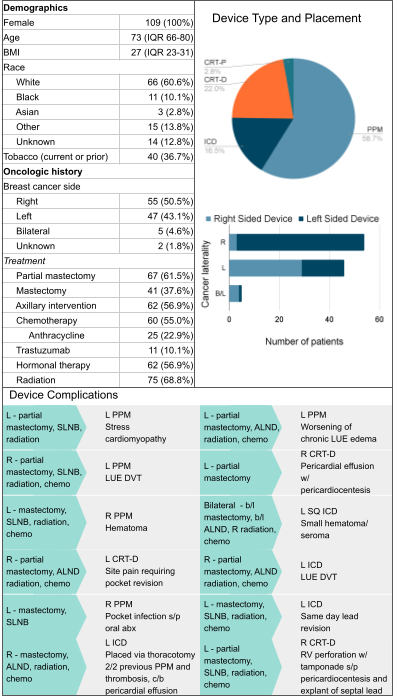Final ID: Su4063
Incidence and Characteristics of Peri-Procedural Complications of Cardiac Implantable Electrical Devices in Breast Cancer Survivors
Abstract Body (Do not enter title and authors here): Introduction: Breast cancer (BC) is the most common non-cutaneous cancer in women. Several BC treatments increase the risk of conduction abnormalities and heart failure, potentially requiring cardiac implantable electrical devices (CIEDs). Due to vascular access devices, surgical management, and chest wall radiation, these patients are subject to upper extremity vascular alterations. There is limited data regarding CIED use in this population.
Research question: Do patients with BC and CIEDs have different procedural approaches or complications compared to the general population?
Aims: This study aimed to evaluate CIED placement and periprocedural complications in patients with a history of BC.
Methods: This was a retrospective study of CIEDs placed at our institution between 2005 and 2023. Patients with a diagnosis of BC prior to time of placement were included. Complications included those within 30 days of the procedure.
Results: We analyzed 109 female patients (median age of 73 years, IQR 66-80) who received pacemaker (PPM, 58.7%), cardiac resynchronization therapy defibrillator (CRT-D, 22%), implantable cardioverter defibrillator (ICD, 16.5%), or cardiac resynchronization therapy pacemaker (CRT-P, 2.8%). The median time from cancer diagnosis to device placement was 13 years (IQR 7-21). Oncologic therapies are included in Figure 1. In patients with unilateral cancer, most devices (78.4%) were placed contralaterally, with 32% of all devices being right sided. Anatomy related to chemotherapy port altered intraoperative approach in 2 cases and bilateral lymph node dissection necessitated subcutaneous ICD in 1 case. Complications were noted in 12 patients (11%) and included hematoma, lead revision, upper extremity DVT, pericardial effusion, stress cardiomyopathy, perforation, site infection, and worsening of chronic lymphedema.
Conclusions: BC survivors undergoing CIED placement appear to be at higher risk of periprocedural complications when compared to the general population. They are more likely to undergo right sided device placement to avoid vascular access ipsilateral to prior surgery or radiation. Further studies are required to understand the long-term outcomes of CIED placement in this cohort of patients.
Research question: Do patients with BC and CIEDs have different procedural approaches or complications compared to the general population?
Aims: This study aimed to evaluate CIED placement and periprocedural complications in patients with a history of BC.
Methods: This was a retrospective study of CIEDs placed at our institution between 2005 and 2023. Patients with a diagnosis of BC prior to time of placement were included. Complications included those within 30 days of the procedure.
Results: We analyzed 109 female patients (median age of 73 years, IQR 66-80) who received pacemaker (PPM, 58.7%), cardiac resynchronization therapy defibrillator (CRT-D, 22%), implantable cardioverter defibrillator (ICD, 16.5%), or cardiac resynchronization therapy pacemaker (CRT-P, 2.8%). The median time from cancer diagnosis to device placement was 13 years (IQR 7-21). Oncologic therapies are included in Figure 1. In patients with unilateral cancer, most devices (78.4%) were placed contralaterally, with 32% of all devices being right sided. Anatomy related to chemotherapy port altered intraoperative approach in 2 cases and bilateral lymph node dissection necessitated subcutaneous ICD in 1 case. Complications were noted in 12 patients (11%) and included hematoma, lead revision, upper extremity DVT, pericardial effusion, stress cardiomyopathy, perforation, site infection, and worsening of chronic lymphedema.
Conclusions: BC survivors undergoing CIED placement appear to be at higher risk of periprocedural complications when compared to the general population. They are more likely to undergo right sided device placement to avoid vascular access ipsilateral to prior surgery or radiation. Further studies are required to understand the long-term outcomes of CIED placement in this cohort of patients.
More abstracts on this topic:
Death-Associated Malfunctions in Boston Scientific ICDs: Insights from Postmarket Device Event Reports (2022–2024)
Attia Monica
A novel approach for LV delay evaluation: non-invasive QLV measurement using UHF ECGPoviser Lukas, Stros Petr, Vesela Jana, Curila Karol

